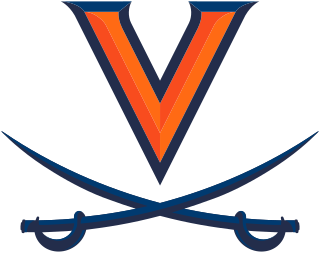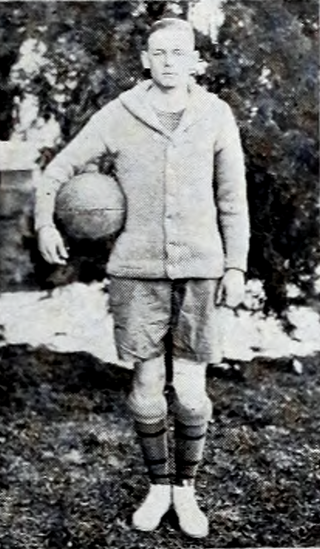
The Virginia Cavaliers, also known as Wahoos or Hoos, are the athletic teams representing the University of Virginia, located in Charlottesville. The Cavaliers compete at the NCAA Division I level, in the Atlantic Coast Conference since 1953. Known simply as Virginia or UVA in sports media, the athletics program has twice won the Capital One Cup for men's sports after leading the nation in overall athletic excellence in those years. The Cavaliers have regularly placed among the nation's Top 5 athletics programs.

Bryan Shelton is a former American college tennis coach and former professional tennis player. Shelton played collegiately for Georgia Tech from 1985 to 1988, and then played professionally from 1989 to 1997. He subsequently returned to his alma mater to coach the Georgia Tech Yellow Jackets women's tennis team, which won the NCAA Women's Tennis Championship in 2007. He previously served as the head coach of the Florida Gators men's tennis team of the University of Florida, where he coached the Gators to winning the 2021 NCAA Championship. He is the only head coach to have won a national championship in both men and women's NCAA Division I Tennis.

The NC State Wolfpack is the nickname of the athletic teams representing North Carolina State University. The Wolfpack competes at the National Collegiate Athletic Association (NCAA) Division I as a member of the Atlantic Coast Conference (ACC) for all sports since the 1953–54 season. The athletic teams of the Wolfpack compete in 22 intercollegiate varsity sports. NC State is a founding member of the ACC and has won ten national championships: four NCAA championships, two AIAW championships, and four titles under other sanctioning bodies. Most NC State fans and athletes recognize the rivalry with the North Carolina Tar Heels as their biggest.

The Clemson Tigers are the athletic teams that represent Clemson University, located in Clemson, South Carolina. They compete as a member of the National Collegiate Athletic Association (NCAA) Division I level, primarily competing in the Atlantic Coast Conference (ACC) for all sports since the 1953–54 season. Clemson competes for and has won multiple NCAA Division I national championships in various sports, including ACC football, men's soccer, and men's golf.

The North Carolina Tar Heels are the intercollegiate athletic teams that represent the University of North Carolina at Chapel Hill. The name Tar Heel is a nickname used to refer to individuals from the state of North Carolina, the Tar Heel State. The campus at Chapel Hill is referred to as the University of North Carolina for the purposes of the National Collegiate Athletic Association. The University of North Carolina at Chapel Hill was chartered in 1789, and in 1795 it became the first state-supported university in the United States. Since the school fostered the oldest collegiate team in the Carolinas, the school took on the nickname Carolina, especially in athletics. The Tar Heels are also referred to as UNC or The Heels.

The Clemson Tigers are the American football team at Clemson University. The Tigers compete in the NCAA Division I Football Bowl Subdivision (FBS) of the National Collegiate Athletic Association (NCAA) and the Atlantic Division of the Atlantic Coast Conference (ACC). In recent years, the Tigers have been ranked among the most elite college football programs in the United States.

The 1981 Clemson Tigers football team represented Clemson University in the Atlantic Coast Conference (ACC) during the 1981 NCAA Division I-A football season. The Tigers were led by head coach Danny Ford and played their home games in Memorial Stadium. Clemson finished their undefeated 1981 season with a 22–15 victory over the #4 Nebraska Cornhuskers in the 1982 Orange Bowl, and were voted #1 in the Associated Press (AP) and United Press International (UPI) polls.

The Florida Gators women's tennis team represents the University of Florida in the sport of tennis. The Gators compete in Division I of the National Collegiate Athletics Association (NCAA) and the Southeastern Conference (SEC). They play their home matches in Linder Stadium on the university's Gainesville, Florida, campus, and are currently led by head coach Roland Thornqvist. In the thirty-nine-year history of the Gators women's tennis program, the team has won twenty-five SEC championships and seven NCAA national tournament championships.

The Clemson Tigers men's soccer team represent Clemson University in the Atlantic Coast Conference of NCAA Division I soccer. The program has won 3 NCAA national championships, 14 Atlantic Coast Conference championships, and hosted 3 Hermann Trophy winners.

Kenny Thorne is a former professional tennis player from the United States. Thorne played collegiately for Georgia Tech from 1985 to 1988, and then played professionally from 1989 to 1997. He is currently the head coach of the Georgia Tech Yellow Jackets men's tennis team.
Shaun Stafford Beckish, née Shaun Stafford, is an American former college and professional tennis player who played on the Women's Tennis Association (WTA) tour from 1989 to 1996. As a collegiate tennis player, Stafford won the 1988 NCAA national singles championship while playing for the University of Florida. She won two WTA tournaments in her professional career, one in singles and the other in doubles.

The Clemson Tigers women's tennis team represents Clemson University in NCAA Division I college tennis. The Tigers are members of the Atlantic Coast Conference. The team is currently coached by Nancy Harris, who is on her 15th season in Clemson. Home games are played in the Hoke Sloan Tennis Center in Clemson, South Carolina. The team has won 9 ACC championships since the program started and earned 18 NCAA Tournament bids. The Tigers finished a season among the top 25 teams in the nation 24 times.

The Citadel Bulldogs men's tennis team represents The Citadel in the sport of tennis. The Bulldogs compete in NCAA Division I's Southern Conference (SoCon). The team hosts its home matches at the Earle Tennis Center on the university's Charleston, South Carolina campus, and are led by hall of fame coach Chuck Kriese. The Bulldogs claimed their only SoCon Championship in 1961. Individual Bulldogs have claimed 19 singles and 9 doubles at the SoCon championships.
Eddie Griffin is a former American collegiate athletic director and collegiate wrestling coach. He served as the athletic director at the University of Central Oklahoma in Edmond, Oklahoma from 2017 to 2020. Prior to this Griffin served as the athletic director at Northeastern State University in Tahlequah, Oklahoma, and the head wrestling coach at Central Oklahoma, and Clemson University.

The 2020 Clemson Tigers baseball team were the varsity intercollegiate baseball team that represented Clemson University during the 2020 NCAA Division I baseball season. The Tigers competed in the Atlantic Coast Conference (ACC) and were led by fifth-year head coach Monte Lee. Clemson played its home games at Doug Kingsmore Stadium in Clemson, South Carolina.

The 2021 Clemson Tigers baseball team are the varsity intercollegiate baseball team that represented Clemson University during the 2021 NCAA Division I baseball season. The Tigers competed in the Atlantic Coast Conference (ACC) and were led by sixth-year head coach Monte Lee. Clemson played its home games at Doug Kingsmore Stadium in Clemson, South Carolina.

John Watson Erwin was an American college basketball coach. Born in Spartanburg, South Carolina, in 1894, he attended Clemson College from 1911 to 1914, where he excelled in both tennis and basketball. Alongside his brother James, he won the Southern Intercollegiate Athletic Association doubles championship in 1913. Erwin played on Clemson's first basketball team in 1912, and was captain and player-coach in the 1914 season. He also coached the 1915 team. After leaving Clemson, he ran a grocery wholesaler in Spartanburg, and died in 1972.













